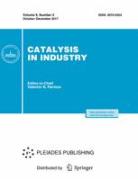Optimization of the Composition of Cellulase Enzymatic Complex Penicillium verruculosum: Improvement of the Hydrolytic Ability Using Methods of Genetic Engineering
https://doi.org/10.18412/1816-0387-2015-6-78-83
Abstract
Application of modern technologies of enzymatic hydrolysis of cellulose-containing raw materials makes it possible to obtain sugars that undergo microbiological conversion to synthesize alcohols (biofuels), organic and amino acids, biopolymers, food additives and other value-added products. Cellulolyticus enzymes of three types – endoglucanase, cellobiohydrolase, beta-glucosidase – are required for the bioconversion of cellulose-containing raw material. The present work is aimed at studying a possibility of application of genetic engineering for improvement of the hydrolytic ability of secretory enzyme complex Penicillium verruculosum by adding homologous and the heterologous cellulases in different combinations and ratios – endoglucanase IV (EGIV) from Trichoderma reesei, endoglucanase II (EGII) and cellobiohydrolase I (CBHI) from P. verruculosum, and also beta-glucosidase (b-GLU) from Aspergillus niger. The optimal ratio of components is determined to double the catalytic activity of the new enzyme complexes.
About the Authors
A. P. SinitsynRussian Federation
O. G. Korotkova
Russian Federation
O. A. Sinitsyna
Russian Federation
A. M. Rozhkova
Russian Federation
G. S. Dotsenko
Denmark
O. V. Proskurina
Russian Federation
D. O. Osipov
Russian Federation
E. G. Kondrat’eva
Russian Federation
A. V. Chekushina
Russian Federation
References
1. Sánchez Ó.J., Cardona C.A. // Bioresource Technol, 2008, v. 99, p. 5270–5295.
2. Ragauskas A.J., Williams C.K., Davison B.H., Britovsek G., Cairney J., Eckert C.A., Frederick W.J., Hallett J.P., Leak D.J., Liotta C.L., Mielenz J.R., Murphy R., Templer R., Tschaplinski T. // Science, 2006, v. 311, p. 484–489.
3. Carmen S. // Biotechnol. Advances, 2009, v. 27, p. 185–194.
4. Menon V., Rao M. // Progress in Energy and Combustion Science, 2012, v. 38, p. 522–550.
5. Gusakov A.V. // Trends in Biotechnology, 2011, v. 29, p. 419–425.
6. Skomarovsky A.A., Gusakov A.V., Okunev O.N., Soloveva I.V., Bubnova T.V., Kondrat’eva E.G., Synitsyn A.P. // Appl.Biochem.Microbiol. 2005, v. 41, p. 182–184.
7. Martins L.F., Kolling D., Camassola M., Dillon A.J., Ramos L.P. // Bioresource Technol., 2008, v. 99, p. 1417–1424.
8. Синицын А.П., Осипов Д.О., Рожкова А.И., Бушина Е.В., Доценко Г.С., Синицына О.А., Кондратьева Е.Г., Зоров И.Н., Окунев О.Н., Немашкалов В.А., Матыс В.Ю., Кошелев А.В. // Биотехнология, 2013, № 5, с. 40–53.
9. Синицын А.П., Черноглазов В.М., Гусаков А.В. Методы исследования и свойства целлюлолитических ферментов. М.: ВИНИТИ, 1990. т. 25. c. 30–37.
10. Gincy M.M., Rajeev K.S., Reeta R.S., Ashok P. // Journal of Scientific & Industrial Research, 2008, No 67, p. 898–907.
11. Kim J., Lee H.J., Choi In-G., Kim K.H. // Appl. Microbiol. Biotechnol., Published on-line 17 August, 2014, DOI 10.1007/s00253-014-6001-3.
12. Harris P.V., Welner D., McFarland, K.C., Re E., Poulsen J.C.N., Brown K., Salbo R., Ding H., Vlasenko E., Merino S., Xu F., Cherry J., Larsen S., Leggio L.L. // Biochemistry, 2010, v. 49, p. 3305–3316.
13. Проскурина О.В., Короткова О.Г., Рожкова А.М., Матыс В.Ю., Кошелев А.В., Окунев О.Н., Немашкалов В.А., Синицына О.А., Синицын А.П. // Катализ в промышленности. 2013. № 5. С. 65–73.
14. Saloheimo M., Nakari-Setala T., Tenkanen M. Penttila M. // European Journal of Biochemistry, 1997, No. 249, p .584–591.
15. Clarke A.J. Biodegradation of cellulose. Enzymology and biotechnology, Technomic Publishing Company Inc., Lancaster, 1997.
16. Schülein M. // J. Biotechnol., 1997, v. 57, p. 71 с 81.
17. Tuohy M.G., Walsh D.J., Murray P.G., Claeyssens M., Cuffe M.M., Savage A.V., Coughlan M.P. Kinetic parameters and mode of action of the cellobiohydrolases produced by Talaromyces emersonii. Biochim. Biophys. Acta, 2002, v. 1596, p. 366 с 380.
18. Короткова О.Г., Рожкова А.М., Матыс В.Ю., Кошелев А.В., Окунев О.Н., Немашкалов В.А., Синицына О.А., Правильников А.Г., Андрианов Р.М., Овешников И.Н., Давидов Е.Р., Синицын А.П. Получение комплексных биокатализаторов на основе ферментных препаратов из рекомбинантного гриба Penicillium verruculosum и их применение в гидролизе отходов деревообрабатывающей и сельскохозяйственной промышленности // Катализ в промышленности. 2011. № 5. С. 61–68.
Review
For citations:
Sinitsyn A.P., Korotkova O.G., Sinitsyna O.A., Rozhkova A.M., Dotsenko G.S., Proskurina O.V., Osipov D.O., Kondrat’eva E.G., Chekushina A.V. Optimization of the Composition of Cellulase Enzymatic Complex Penicillium verruculosum: Improvement of the Hydrolytic Ability Using Methods of Genetic Engineering. Kataliz v promyshlennosti. 2015;15(6):78-83. (In Russ.) https://doi.org/10.18412/1816-0387-2015-6-78-83



























